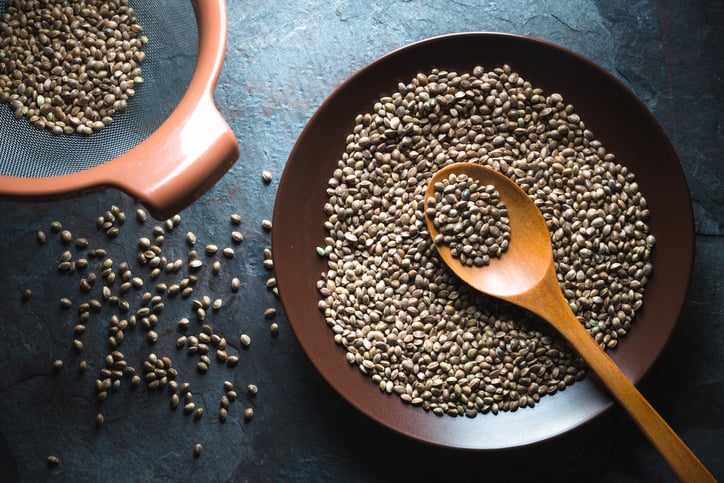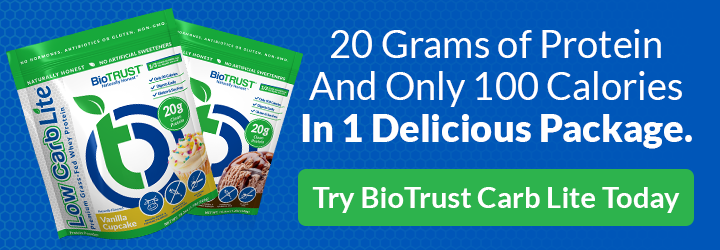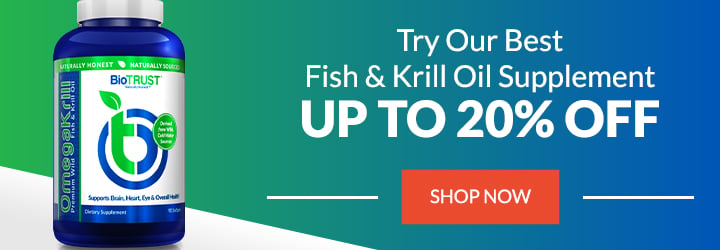12 Delicious Protein-Rich Superfoods You Need in Your Diet

“Superfood” is kind of a buzzword now. What are these foods with so-called superpowers? Do they have magical properties? What makes them so special? And do you really need to add açai or goji berries to your diet to be healthy? What about protein-rich superfoods? (Might as well get two for the price of one, right?) Do they even exist? And if so, what are the best sources?
For starters, let’s take a quick look at the definition for superfoods…according to dictionary.com, a superfood is “a food considered exceptionally good for one’s health and for boosting the immune system owing to its naturally high content of vitamins, minerals, fiber, antioxidants, or omega-3 fatty acids.”
That definitely sounds like something we should be including in our diets. What’s more, many of these protein-rich superfoods increase the amount of nutrients we eat without increasing the number of calories we consume (and often decreasing them)—a win-win for a healthy metabolism and dropping excess body fat.
This is especially vital as we age because getting an optimal amount of nutrients—without too many calories—can become more challenging. Why? Because as we get older, we tend to eat less yet our bodies don’t seem to absorb nutrients as well as they did when we were younger.
Nutrient-dense foods are also important because they provide essential vitamins and minerals we need without leaving us hungry or feeling deprived—so we don’t consume too many calories. In other words, a diet rich in nutrient-dense foods can help us enjoy a healthy body weight without having to count, or restrict, calories. In fact, due to their fiber and water content, many superfoods are also very high volume yet low in calories (called “low-energy-density”), and that means you can often eat more and still lose weight.
We’ve often talked about the benefits of protein and why it’s important for serious, sustained weight loss. As Coach Tim recently shared, “Research has shown that consuming diets higher in protein is not only safe for otherwise healthy individuals, these diets may provide a host of health benefits. Higher protein diets can help:
- Enhance weight loss
- Accelerate fat loss
- Reduce belly fat
- Protect (and even build) calorie-burning muscle
- Preserve metabolic rate after weight loss
- Prevent weight regain
- Promote long-term weight maintenance
- Boost metabolic rate
- Increase satiety and improve appetite control
- Improve markers of heart health
- Support glycemic control
- And more!”
So, eating foods that are both high in protein as well as nutrient density obviously offers big benefits. Fortunately, nature already thought of all that and has some pretty awesome “pre-packaged” options that combine protein with nutrient density.
Without further ado, here are the top 12 protein-rich superfoods that provide the most bang for the buck. With so many choices, you’re bound to find at least a few that fit into your personal tastes and nutritional needs.
Protein-Rich Superfoods List
1. Spirulina: 1 tablespoon contains just 20 calories yet packs 4 grams of protein and is a good source of antioxidants, B vitamins, iron, calcium, and a wealth of other nutrients. In fact, some have named spirulina “the most nutrient-dense food on the planet.”
Special Offer:Get MetaboGreens up to 20% OFF (very limited inventory)
2. Chia Seeds: A single ounce (about 2 tablespoons) of these little seeds provides 138 calories and 4.7 grams of protein along with 11 grams of fiber. It’s also another rich source of vitamins and minerals, and though it comes in a tiny package, it packs quite the nutritional punch.
3. Pumpkin Seeds: These delicious seeds provide a wide variety of healthy nutrients, including iron, magnesium, manganese, copper, selenium, and zinc, and they are also rich in antioxidants and phytosterols. If you consume two tablespoons, you’ll fill up on 125 calories and 5 grams of protein and 5 grams of fiber.
4. Hemp Seeds: With more than 25% of total calories coming from protein (and 30% as essential fatty acids), hemp seeds, or hearts, are surprisingly nutrient dense. Just 3 tablespoons provide 10 grams of protein (which makes it a lock as one of our protein-rich superfoods) and 10 grams of healthy omega-3 and omega-6 fats with 170 calories. Hemp seeds are also lower in carbohydrates than other popular seeds, like flax and chia, and are high in manganese, magnesium, and phosphorus as well as GLA (gamma linolenic acid), another healthy fat.
5. Lentils: Another one of the fantastic vegetarian protein-rich superfoods is lentils. A one-cup serving will provide 230 calories, 16 grams of fiber, and 18 grams of protein along with a healthy dose of folate, manganese, iron, and phosphorous (in addition to other key nutrients). Plus, they’re super affordable, tasty, and easy to cook.
6. Whey Protein: This rapidly digested protein provides the highest concentration of the amino acid leucine, which is critical for building and maintaining calorie-burning lean muscle, and has been shown to decrease hunger more than other protein sources. It can also boost levels of glutathione, the body’s “master antioxidant”, and glutamine, which is required for optimal immune function. Not all protein products are the same, though. Not by a long shot. So, search out quality sources. As different brands have slightly different profiles, I’ll focus in on our current favorite: BioTrust Platinum 1.
7. Peanut Butter: Peanuts are rich in vitamin E, magnesium, potassium, and Vitamin B6, but what many people don’t know is that they’re packed with antioxidants. In fact, peanuts contain the popular anti-aging antioxidant resveratrol, which is most commonly associated with red wine and grapes. Believe it or not, peanuts have a higher polyphenol content (a category of antioxidants) than almonds, Brazil nuts, cashews, macadamia nuts, and pine nuts. A generous 2 tablespoons of this creamy, rich nut butter provides 188 calories, 8 grams of protein, and 2 grams of fiber. Just make sure you get an all-natural version that contains just nuts (without unnecessary additives)!
8. Eggs: Within a mere 75 calories, one large egg provides 7 grams of the highest quality protein combined with iron, choline, all the fat-soluble vitamins, various minerals, and copious antioxidants, including the carotenoids, lutein and zeaxanthin, among a laundry list of other key nutrients. Eggs also provide the essential omega-3 fatty acid DHA, which is vital for brain, eye, and heart health.
9. Liver: Organ meats are 10 to 100 times higher in nutrients than the usual muscle cuts of meat because they store key nutrients including vitamins A, D, E, K, and B12, and folic acid, along with minerals like copper and iron. A 3-ounce serving of beef liver will supply your body with 140 calories and 22 grams of protein (making it a no-brainer on our protein-rich superfoods list). As with all meats, look for pasture-raised, grass-fed sources.
10. Grass-Fed Beef: Grass-fed beef has significantly more omega-3 fatty acids (and substantially fewer omega-6s) and CLA (which stands for conjugated linoleic acid, another healthy fat that’s been shown to reduce body fat and increase calorie-burning lean muscle as well as support the immune system) than conventional beef. One of the best protein sources around, it also provides vitamins A and E, niacin, B5, selenium, and various other nutrients. Different cuts vary in both calories and protein. For example, a lean beef strip steak provides 49.4 grams of protein in just 250 calories, while 90% lean ground beef provides 22 grams of protein in 200 calories.
11. Wild Salmon: Salmon is another extremely nutritious food—as long is it’s caught in the wild rather than farmed. In addition to its omega-3 fatty acid content, salmon is loaded with vitamin B12 (236% DV), vitamin D (127% DV), selenium (78.3% DV), and numerous other nutrients. A 3.5-ounce serving of sockeye or red salmon has 27 grams of protein and 220 calories.
12. Sardines: For just 190 calories, you’ll find 23 grams of protein plus a hearty supply of vitamin B12, selenium, phosphorous, and vitamin D. Of course, sardines are another extremely rich source of omega-3 fats in addition to other vitamins and minerals. What’s more, with sardines, unlike other fish, you don’t need to worry about contaminants like toxins and heavy metals (i.e., mercury).
Maybe you can’t have your cake and eat it too, but you can have your protein with a wealth of other health-promoting nutrients too in any of the above protein-rich superfoods. What are your favorite choices?







